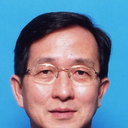Experimental study of anti-tumor effects of polysaccharides from Angelica sinensis.
Keywords
Abstract
OBJECTIVE
To investigate the in vivo anti-tumor effects of total polysaccharide (AP-0) isolated from Angelica sinensis (Oliv.) Diels (Danggui) on mice and the in vitro inhibitory effects of AP-0 and the sub-constituents (AP-1, AP-2 and AP-3) separated from AP-0 on invasion and metastasis of human hepatocellular carcinoma.
METHODS
Three kinds of murine tumor models in vivo, sarcoma 180 (S180), leukemia L1210 and Ehrlich ascitic cancer (EAC) were employed to investigate the anti-tumor effects of AP-0. For each kind of tumor model, three experimental groups were respectively given AP-0 at doses of 30, 100 and 300 mg/kg by ip once a day for 10 days. Positive control groups were respectively given Cy at a dose of 30 mg/kg for S180 and leukemia L1210, and 5-FU at a dose of 20 mg/kg for EAC. On d 11, mice bearing S180 were sacrificed and the masses of tumors, spleens and thymus weighed. The average living days of mice bearing EAC and of mice bearing L1210 were observed, and the rates of life prolongation of each treatment were calculated, respectively. The inhibitory effects of APs on hepatoma invasion and metastasis in vitro were investigated by employing human hepatocellular carcinoma cell line (HHCC) with the Matrigel invasion chamber, adhesion to extracellular matrix and chemotatic migration tests, respectively.
RESULTS
AP-0 had no obviously inhibitory effect on the growth of S180, but it could significantly decrease the thymus weights of the mice bearing S180. AP-0 could significantly reduce the production of ascitic liquids and prolong the life of mice bearing EAC. AP-0 could also increase the survival time of mice bearing L1210. AP-0 and AP-2 had significantly inhibitory effects on the invasion of HHCC into the Matrigel reconstituted basement membrane with the inhibitory rates of 56.4 % and 68.3 %, respectively. AP-0, AP-1, AP-2 and AP-3 could influence the adhesion of HHCC to extracellular matrix proteins (Matrigel and fibronectin) at different degrees, among them only AP-3 had significant blocking effect on the adhesion of HHCC to fibronectin with an inhibitory rate of 30.3 %. AP-0, AP-1 and AP-3 could partially inhibit the chemotactic migration abilities of HHCC.
CONCLUSIONS
The experimental findings suggest that the total polysaccharide of Angelica sinensis (Oliv.) Diels (Chinese Danggui) possesses anti-tumor effects on experimental tumor models in vivo and inhibitory effects on invasion and metastasis of hepatocellular carcinoma cells in vitro.


